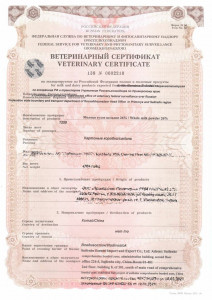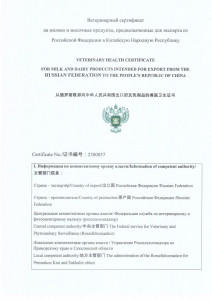Powdered milk in China
In the article we will talk about a product that, for specific reasons, has become one of the most imported in China. This is Powdered milk. Let's start with the fact that China is now one of the leaders in milk production and consumption, but this has not always been the case. In 1999, a nationwide campaign was launched in China, the purpose of which was to teach all children to drink milk daily in order to catch up and overtake their peers from other countries and especially from Japan in height and weight.
The Government of the People's Republic of China supported the domestic dairy market by subsidizing the growth of production of dairy raw materials, which are still scarce in China today. The annual increase in milk production in China is about 20 percent. In 2021, China plans to increase consumption of dairy products by 5%, to 34.5 million tons. Such forecasts were made by experts of the US Ministry of Agriculture. However. Although China is the second largest economy in the world by GDP, it has not had high-quality and safe milk for many years.
No one would have thought that China, a huge agricultural country with a traditional agricultural culture, would not be able to afford safe domestic milk. 20 years of economic development has caused an existential crisis and put the Chinese people in a terrible situation.
A little bit about milk production
Traditionally, in addition to low yields, farmers have another problem, the seasonality of milk production, in winter the production of raw milk falls by half or three times. Powdered milk, which is harvested in the summer season, helps to fill the shortage. In case of acute seasonal fluctuations, milk powder is an important stabilizing reserve for processors. It is harvested at their own drying plants in the summer, when the supply of raw milk is excessive, thereby saving farmers from overproduction and a catastrophic drop in prices. It is produced in the same way as all other dairy products, from raw milk.
Powdered milk is used not only for milk recovery, but also in the production of sausages, ice cream and confectionery. There is no way to do without powdered milk in these industries.
Surprisingly, reconstituted milk is more expensive than usual at cost. However, there is nothing to be surprised about, the price of powdered milk is a derivative of the cost of raw milk. First it needs to be dried, and then restored — these are additional costs for electricity, labor, depreciation of equipment (it takes about six hours for one drying cycle), long-term storage, etc. It is necessary to control the quality of milk powder, which, of course, is also done for raw milk.
Powdered milk is convenient because it can be prepared in advance, stored for a long time and easily transported. Everyone, both producers and processors, knows that there will not be enough raw milk in winter and it will be impossible to meet the increased demand for dairy products. And milk is a product of daily consumption, it is included in the grocery basket of every person.
Powdered milk does not differ from raw milk in terms of fat, protein, and lactose content. Minerals completely pass into it from raw milk. The reconstituted milk contains slightly less B vitamins and a significant part of vitamin C is lost, since milk is dried at high temperatures, and vitamin C does not withstand temperature treatment.
Now there is an increase in demand for powdered milk on the Chinese market, it has an annual growth rate of about 22%, this is a factor that encourages China to buy imported powdered milk.
The existing local milk is not very popular in China. One of the reasons for this was the so-called "melamine scandal" of 2008, when it turned out that a number of Chinese food manufacturers added melamine to their products in order to increase the measured protein concentration, as a result of which products, which included widely used dry milk mixtures for infants, became dangerous to health. Although melamine is considered a low-toxic substance, a number of studies have obtained data on malignant diseases and the formation of stones in the urinary system with prolonged consumption of food containing ultra-high concentrations of melamine. It was also reported that the total number of children poisoned by low-quality dairy products was about 300 thousand, of which 53 thousand were in China, six children died and 100 were in critical condition.
At the moment, imported milk powder is considered a luxury item in China and even a status symbol. Many Chinese spend a lot of money to buy imported milk powder as gifts for relatives and friends. The Chinese themselves explain the popularity of imported milk powder by the fact that local milk powder is of poor quality, and the child will have stomach upset after eating it, but there will be no imported milk. Considering also that Chinese families are already allowed to have a second child, it can be concluded that the demand for high-quality milk mixtures will increase. Now foreign milk powder is so popular that it occupies from 70 to 80% of the milk powder market in China. People are willing to overpay, but buy quality imported milk.
For these and other reasons, including the gradual increase in the number and welfare of the Chinese population, imported milk is a priority for the Chinese. Not so long ago, Russian products began to enter the Chinese market. A combination of factors - growing demand, Chinese consumers' trust in Russian producers, open up great opportunities for Russian exporters of dairy products.
In 2018, China and Russia jointly signed an agreement on the export of dairy products to the Chinese market. According to statistics, in 2019, Russia exported 480 tons of dairy products to China for a total of 919,000 US dollars. However, at that time, in the agreement, powdered milk was not included in the list of dairy exports. Therefore, allowing the export of milk powder to China in the fall of 2020 opens up very great prospects, and this is very good news for producers of high-quality Russian milk powder.
Features of milk powder export to China
Despite the huge needs of the Chinese food industry in dairy productsexportmilk powder to China is complicated by a number of circumstances.
The Chinese authorities have imposed restrictions on imported milk. The Chinese government has tried to switch the need for foreign raw materials to domestic products and support the sales of Chinese companies.
Foreign manufacturers are required to register products, enterprises and warehouses before their products can enter the domestic market of China. The government also obliged manufacturers to supplyproductlabels in Chinese.
How to pass veterinary control for powdered milk
The final list of Russian dairy enterprises that have received permission includes only those who can actually fulfill China's requirements at the moment. Such a strict selection is due to the fact that at the first violation recorded by the Chinese supervisory authorities, the country can close supplies for the entire list of Russian enterprises.
Rosselkhoznadzor reported that the trade of dairy products between Russia and China will include condensed and non-condensed cream, buttermilk, yogurt, kefir, whey, butter, cheese, cottage cheese and casein obtained from cow's milk, goat's milk and sheep.
Dairy cattle used to produce raw milk for exported dairy products must be supplied by farms free of foot-and-mouth disease, cattle plague and small ruminants, sheep pox, goats and other dangerous diseases, farms must be under the control of the competent authority of the PRC or the state veterinary service of Russia.
In order to be able to export dairy products to China, the Russian manufacturer must be included in the list of enterprises allowed to export products. You can find a list of approved enterprises in Cerberus.
The company must also be located in the Chinese information system for registration of foreign enterprises CIFER,
Products can be sent to China only from specially certified warehouses for the export of products, the exporter must have a platform in the Argus system to obtain an export permit.
In addition to information about the competent authority, the sending company and the goods in the veterinary certificate for milk and dairy products intended for export from the Russian Federation to China, the exporter must confirm the certification of the health of the exported products with a health certificate.
After passing all the necessary procedures and complying with all the requirements described in detail on the Rosselkhoznadzor website, you submit a Veterinary Certificate of Form 2, which accompanies all dairy products in Russia, and instead of it at the checkpoint you receiveveterinary certificate5dandveterinary health certificate These documents are required for the export of milk powder to China. To submit and issue an export customs declaration, you will also need a stamp on the bill of lading issue is allowed.
- Views: 13008
- Government Resolution No. 778 dated 07/06/2018
- Which goods are declared as one product
- Government Resolution No. 2240 dated 07.12.2022
- What is required for DS according to TR CU 009/2011
- What is required for CC or DS according to TR CU 004/2011
- What is required for CC or DS according to TR CU 020/2011
- Customs control of the value of goods





